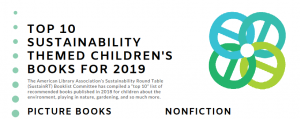By Kayla Kuni
Libraries are the perfect place to have sustainability discussions since libraries are known for providing educational opportunities. At my former public library, we hosted films that focused on environmentalism followed by community discussion. The library then began hosting a weekly organic farmer’s market (which continues to this day) to better inform local residents about the concept of eating locally and eating with the seasons. I heard several customers ask why they could not buy a tomato from local farmers, but they could get one from Winn Dixie. Our local farmers could then educate our residents about how far that tomato had to travel to arrive at Winn Dixie and how the transportation process of said tomato was actually leaving a huge ecological impact on the environment. The library’s collection provided further evidence for the patron to read in order to confirm what they had learned at the market.
As structures, libraries are being designed with sustainability in mind. The green report cards issued by San Francisco Public Library are inspiring. The report cards take into account the LEED standards of “sustainable site development, water savings, energy efficiency, materials selection, and indoor environmental quality” (“Green Report Cards,” 2019, para. 2). While the budget for San Francisco Public Libraries is relatively high compared to others, and some may feel that LEED standards are expensive to implement, there are design decisions that come into play when a library building is renovated.
The topic of paper usage (Hitchcock & Willard, 2015, p. 39) is one that is very interesting since libraries tend to print a lot in lieu of storing information on something like a digitized spreadsheet. In some ways libraries are very behind with the times in that certain policies require printed records to be retained. That being said, libraries are often on the cutting edge of digitizing resources. Perhaps librarians can be bigger advocates for change in how we envision records to be retained in the future and why they feel that changes need to be made. The cost of the paper, and the ink for printing, is very high, but what truly alarms me is that so much time is wasted in dealing with paper (Hitchcock & Willard, 2015, p. 39). Hitchcock & Willard’s (2015) suggestion that productivity is lost, resources are wasted, and nothing additional is added to the company’s value, should make any organization consider going paper free.
The topic of sustainability and libraries is one that I have a great deal of interest in. In 2017, I returned to school in order to work on an MBA with an emphasis in sustainable businesses. At the American Library Association Midwinter meeting this past January in Seattle, the ALA Council (of which I am an elected member) voted to include “sustainability” as a core value in librarianship (ALA, 2019). If we are truly passionate about it, we need to have conversations about what sustainability is and what behaviors we need to change to become more sustainable.
References
American Library Association. (2019, January 29). ALA adds sustainability to core values. Retrieved from https://clrc.org/49707-2/
“Green Report Cards.” (2019). San Francisco Public Library. Retrieved from
https://sfpl.org/?pg=2000187201
Hitchcock, D. & Willard, M. (2015). The business guide to sustainability: Practical strategies and tools for organizations (3rd ed.). New York, NY: Routledge.
Kayla Kuni is a librarian at Pasco-Hernando State College. Prior to working for PHSC, Kayla worked in a public library for over six years. In both academic and public libraries, Kayla has taught future business owners how to access resources that will help grow small businesses. In 2017, she was named the Outstanding Public Servant by the West Pasco Chamber of Commerce for her work with the community. Kayla is pursuing an MBA, with an emphasis on sustainability, from the University of South Florida.
